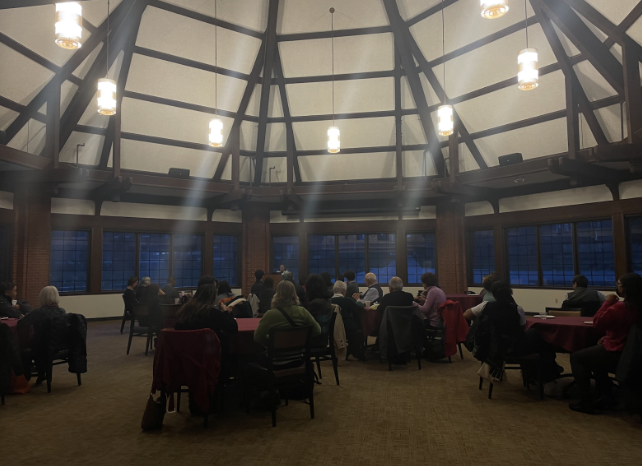
By Kaya Heimowitz
On the evening of Tuesday, February 21, members of the University of Puget Sound and the wider Tacoma community gathered in the Rasmussen Rotunda to honor the Japanese Day of Remembrance. This day honors the 120,000 Japanese Americans forcibly removed from their homes and relocated to internment camps during World War II.
Lorna Hernandez Jarvis, the Vice President for Institutional Equity and Diversity, opened the event with a brief introduction to Executive Order 9066, which mandated the evacuation of all people of Japanese ancestry from the West Coast.
Three University students with Japanese ancestry, Caitlyn Kadooka, Luka Kitamura, and Olivia Harston, spoke about their identities and family history and the impact of Executive Order 9066. Then they alternated reading the names of the 36 University of Puget Sound students impacted by Executive Order 9066.
We reprint the list in full to remember their struggle. They are as follows: Yoshiko Fujimoto, Thomas Goto, Toru Hamaguchi, Jack Hata, Ken Hayashi, Tsuyoshi Horike, Ken Inaba, Ben Ishioka, George Ishioka, Masaye (Esther) Jingui, Masayoshi Jinguji, Michiko Jinguji, Yoshiye Jinguyi, Waichi Kawai, Leo Kawasaki, Aiko Kimura, Hatsuye Kurose, Takanobu Matsui, Ryo Munekata, George Keiji Omori, Kenji Oayanagi, Wiachi Oyanagi, Hidemaru Sato, Mayme Semba, Hugy Y. Seto, Thomas Seto, George Takahashi, Maso Tanabe, Yutaka Tanabe, Yutaka Tanabe, Minoru Tsuchimochi, June Uyeda, Shigeo Wakamatsu, Salem Yagawa, Genji Yamamoto, Margaret Yamamoto, James Yoshioko.
After the names were read, the keynote speaker, Merilee Tanbara, was introduced. Tanbara was born and raised in Tacoma, and is currently in the process of writing a book based on her mother’s stories about being interned during WWII. Tanbara’s mother was from Tacoma, but was put in the Heart Mountain camp in Wyoming, where she met Tanbara’s father. 2,000 Japanese people in Tacoma were placed in internment camps because of Executive Order 9066. Tanbara’s novel is historical fiction, and focuses on the questions, “What was it like to be an American when you look like the enemy?” “How does it feel to come back to Tacoma when your community is gone?” and “What was life like when they got back?”
Prior to Executive Order 9066, there were 2,000 Japanese Americans in Tacoma and 180 Japanese-owned businesses, but many people did not return to Tacoma. For the people who did return, the entire community was different. It was the same streets and houses and buildings, but different people and businesses living and working inside them. There used to be a market run by mostly Japanese Americans in Tacoma, similar to Pike Place in Seattle, that to this day only exists as an empty lot. People did not want to return to Tacoma, because ultimately, there was nothing for them to return back to.
The film, “Executive Order 9066: All Persons of Japanese Ancestry,” was produced by The Chinese Reconciliation Project Foundation and Bates Technical College with funding from Tacoma Creates. The film follows Tanbara as she researches and writes her novel. She joins a Japanese American writing group and talks about how she cried when she first read her stories aloud, visits Heart Mountain camp where her parents were interned and discusses the changes in the demographics of Tacoma as a result of Japanese internment. The film ends with a clip of remarks given by Ronald Reagan on signing the bill providing restitution for the wartime internment of Japanese American civilians. The final line of the film is, “Yet we must recognize that the internment of Japanese Americans was just that: a mistake.”
After the film, Tanbara led a presentation going into more detail about the lives of four Japanese Americans, including her family members. She also provided information about how the University of Puget Sound attempted to make peace with what happened to its students. In 2009, the university held a ceremony presenting the 36 students with an honorary award of a Bachelor of Arts. Of the 36 Japanese American students, six attended the event. For the 30 not in attendance, some of them simply lived far away as the government did not encourage them to move back to the West Coast, or they did not want to move back after what happened, and for other students, they did not want to relive the painful memories from that era of their lives.
Tanbara ended her presentation discussing the ways we see history repeating itself, and spoke against the Northwest ICE Detention Center that essentially imprisons people in inhumane conditions — sometimes for years.
